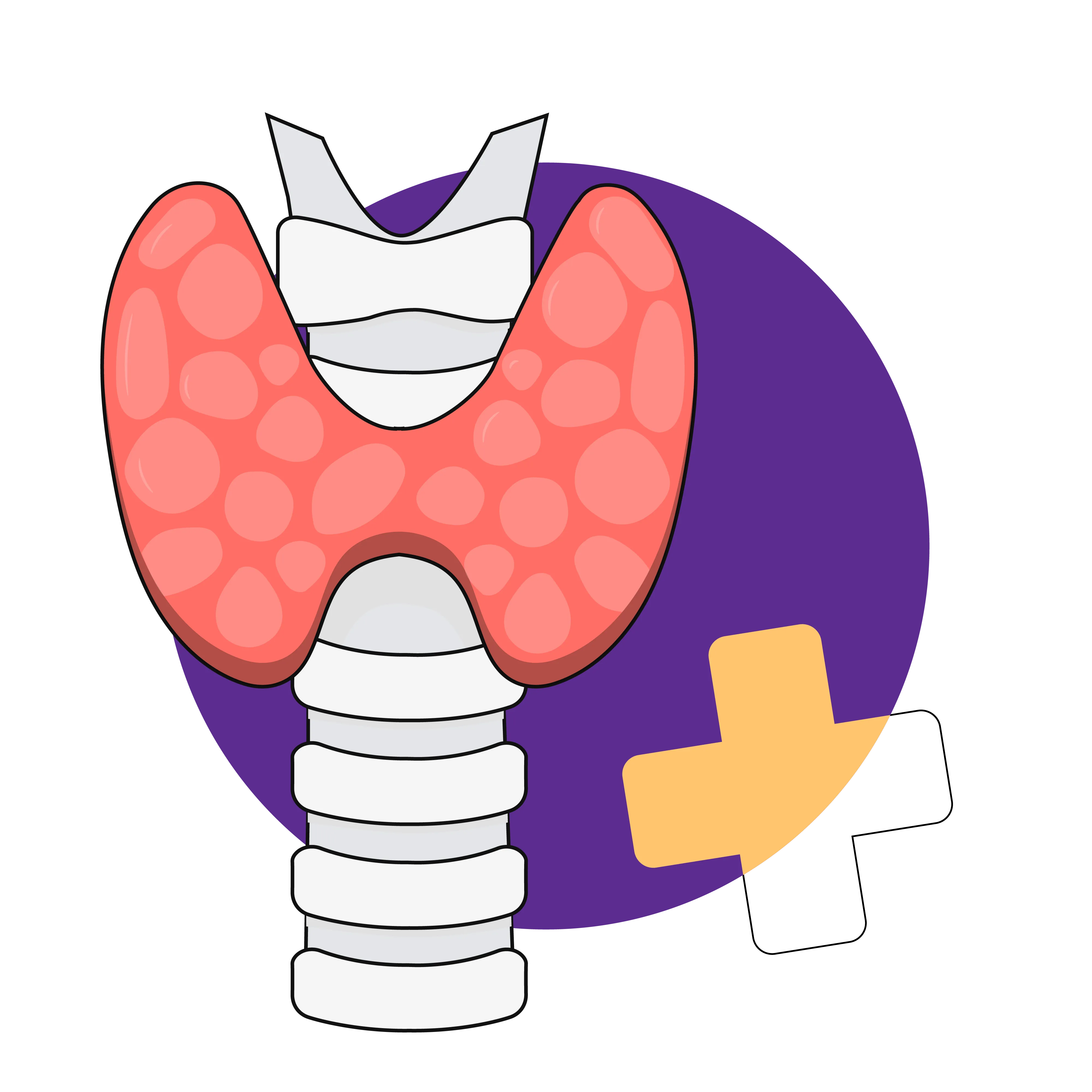Thyroid | 6 min read
Subacute Thyroiditis: Risk Factor, Types, Treatment, Diagnosis
Medically reviewed by
Table of Content
Synopsis
Subacute thyroiditis is the inflammation of the thyroid gland. The thyroid gland is a small organ in front of the neck. This gland is responsible for metabolism and initiates the proper development of the human body.
Key Takeaways
- The thyroid hormones help to regulate metabolism
- Thyroid hormone is crucial for brain development in children
- Thyroid hormone also looks after other human aspects like hair growth, weight, and energy
The thyroid hormones are responsible for emotional responses such as fear, anxiety, and excitement. These pointers are enough to understand how the proper functioning of the thyroid gland is essential for human health. However, some condition that affects the thyroid gland’s functioning is called thyroiditis. It is nothing but the swelling of the gland caused due to some disorders. The most commonly known conditions are Hypothyroidism or hyperthyroidism. In the case of subacute thyroiditis, the person experiences discomfort and pain in the neck. People suffering from this develop symptoms of hyperthyroidism and Hypothyroidism as per the progression. Read further to know more about subacute thyroiditis symptoms, causes & treatment.
What is Subacute Thyroiditis?
Subacute thyroiditis is a self-limited health condition linked with pain and tenderness in the thyroid gland [1]. People also suffer from thyroiditis symptoms such as fever, sore throat, and flu. The type of subacute thyroiditis includes De Quervain's thyroiditis and subacute nonsuppurative thyroiditis. Initial hyperthyroidism is visible slowly and may develop into Hypothyroidism. According to a source, 10% of patients suffering from Hypothyroidism are because of subacute thyroiditis. This condition is usually temporary and may completely resolve within 12-18 months. However, the risk of permanent hypofunction is there. Therefore, recognizing the situation at the earliest is best for further treatment.
Subacute Thyroiditis Causes and Risk Factors
Subacute thyroiditis causes are the result of a viral infection. This condition is visible after viral infections of the ear and throat. As a response to the virus attack, the thyroid gland swells and disrupts the flow of hormones. Subacute thyroiditis is more common in women of 40-50 age [2].
The pain in the neck may slowly spread to the jaw and the ear. The person might feel more pain while swallowing food or turning their head. It's thought of as a dental problem or throat infection at first.

Symptoms of Subacute Thyroiditis
As previously mentioned, the pain in the neck may slowly progress to other body parts like the jaw and ear. The thyroid gland may remain swollen for weeks & in some cases, the pain may remain for 1 to 3 months. However, if you experience these symptoms for longer, it is good to consult the doctor immediately. The other subacute thyroiditis symptoms include:
- Tender thyroid gland
- Low-grade fever
- Extreme tiredness
- Difficulty in swallowing
- Huskiness
The swollen thyroid gland may likely release over hormones causing hyperthyroidism. It is common in the initial stage of subacute thyroiditis. These are a few hyperthyroidism symptoms:
- Hair loss
- Weight loss
- Irregular bowel movement
- Irregular menstrual cycle
- Lack of concentration
- Anxiety
- Restlessness
- Mood swings
- Sweating due to increased body heat
- Irregular heartbeat
As the disease enters the secondary stage, hyperthyroidism is replaced by Hypothyroidism. The symptoms include:
- Weight gain
- Dry skin
- Irregular or heavy periods in women
- Fatigue & Depression
- Cool intolerance, constipation
The second stage may continue for 9-15 months.
Additional Read: Signs That Your Thyroid Hormone Function Needs Checking!

Types of Subacute Thyroiditis
subacute thyroiditis are classified based on subacute thyroiditis causes. It is categorized into four types:
- Subacute granulomatous thyroiditis is called De Quervain's or giant cell thyroiditis. It is the most common form of subacute thyroiditis seen in people of all ages and genders. It occurs due to a viral infection of the upper respiratory tract.
- Palpation thyroiditis, This subacute thyroiditis results from mechanical damage to thyroid follicles. It occurs due to repeated thyroid examinations or surgical manipulation. The initial hyperthyroidism happens due to the leakage of thyroid hormone in the blood.
- Postpartum thyroiditis occurs within one year after giving birth to the child. In most cases, the women who develop postpartum thyroiditis may have an underlying autoimmune disease that results in inflammation. As per the national institute health report, this condition affects about 8% of pregnancies. In the first phase, hyperthyroid symptoms are visible. Then it may return to a normal state or develop Hypothyroidism. One may also experience problems in thyroid and headaches together at this stage. Low energy, dry skin, poor memory, and concentration problems. If the symptoms continue even after one year, it is not considered postpartum thyroiditis.
- Subacute lymphocytic thyroiditis, This is common in females. A variant of this type occurs in the postpartum period. It is a subtype of Hashimoto’s thyroiditis and has an autoimmune basis similar to postpartum thyroiditis. The symptoms in this state include the development of a small goiter without tenderness. Both hyperthyroid and hypothyroid phases are visible. The period of each phase may vary. Usually, each phase remains for 2-3 months.
How is Subacute Thyroiditis Diagnosed?
The doctor may ask about the patient's medical history and any recent virus infection. A thorough neck examination is conducted and then checks for the possibility of subacute thyroiditis. In some cases, subacute thyroiditis symptoms are misdiagnosed as thyroid nodules or thyroid cancer symptoms. Although, lab reports help the doctor to get a clear idea.
Experts suggest a blood test measure subacute thyroiditis. The test helps measure the TSH levels. These levels help the doctor to understand the subacute thyroiditis stage. In the initial phase, the T4 level will be high and the TSH level low, whereas you can see the reversed levels later.
Other laboratory tests for subacute thyroiditis include:
- Thyroid ultrasound
- Thyroglobulin level
- C reactive protein (CRP)
- Radioactive iodine uptake and ESR.
Subacute Thyroiditis Treatment
The doctor would suggest the medicine to reduce pain and control inflammation. Here are a few other subacute thyroiditis treatments prescribed by the doctor:
Beta-blockers:
The doctor prescribes beta-blockers to cure hyperthyroidism if present in the initial stages. This medication helps to control active thyroid symptoms like anxiety, heat intolerance, and palpitations.
Corticosteroids:
The doctors prescribe corticosteroids to provide relief in swollen areas. The most common one used to treat subacute thyroiditis is prednisone. In the beginning, a doctor may prescribe 15 to 30 milligrams. Corticosteroids are also referred to for other diseases like asthma and arthritis.
NSAIDs (Non-steroidal anti-inflammatory drugs):
They help reduce pain in swollen areas in mild cases. Medication like aspirin and ibuprofen reduces inflammation which helps to get relief from pain. It is accessible without prescription. However, self-medication is harmful.
The treatment at the beginning is quite helpful in slowing the development rate. Usually, subacute thyroiditis treatment is temporary.
Additional Read: Yoga for ThyroidPrevention Tips For Subacute Thyroiditis
Preventing all diseases starts by staying healthy and practicing prevention methods, such as:
- Maintain a healthy diet by including essential nutrients, proteins, and fibers
- Regular exercise helps to increase immunity levels and reduce anxiety levels
- Avoid unhealthy practices like smoking and alcohol
- Maintaining a proper sleep cycle
- Daily exercises also promote better sleep
- If the viral infection is severe, consult the doctor without fail
- Vaccines to prevent viral infection may help to lower the chances of subacute thyroiditis
After the diagnosis of subacute thyroiditis patient usually panics. However, permanent cases of this thyroid condition are extremely rare. As per a report, only 5% of subacute thyroiditis transforms into permanent hyperthyroidism [3]. Usually, a speedy recovery is witnessed due to proper medical guidance. Another thing that even the doctor suggests is to have positive thoughts and take medicines on time. Rather than imagining the worse, utilize this time to understand the health condition and practice healthy habits.
The best way to reduce its chances is to consult the healthcare providers as soon as possible. If you are looking for the option to consult a doctor at your convenience, try Bajaj Finserv Health’s online doctor consultation facility. Take a step towards a healthy life.
References
- https://www.ncbi.nlm.nih.gov/books/NBK279084/
- https://www.sciencedirect.com/topics/nursing-and-health-professions/subacute-thyroiditis
- https://emedicine.medscape.com/article/125648-clinical
Disclaimer
Please note that this article is solely meant for informational purposes and Bajaj Finserv Health Limited (“BFHL”) does not shoulder any responsibility of the views/advice/information expressed/given by the writer/reviewer/originator. This article should not be considered as a substitute for any medical advice, diagnosis or treatment. Always consult with your trusted physician/qualified healthcare professional to evaluate your medical condition. The above article has been reviewed by a qualified doctor and BFHL is not responsible for any damages for any information or services provided by any third party.





